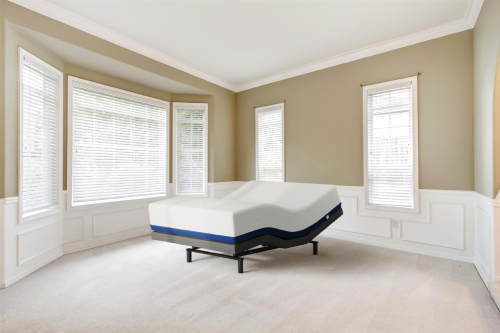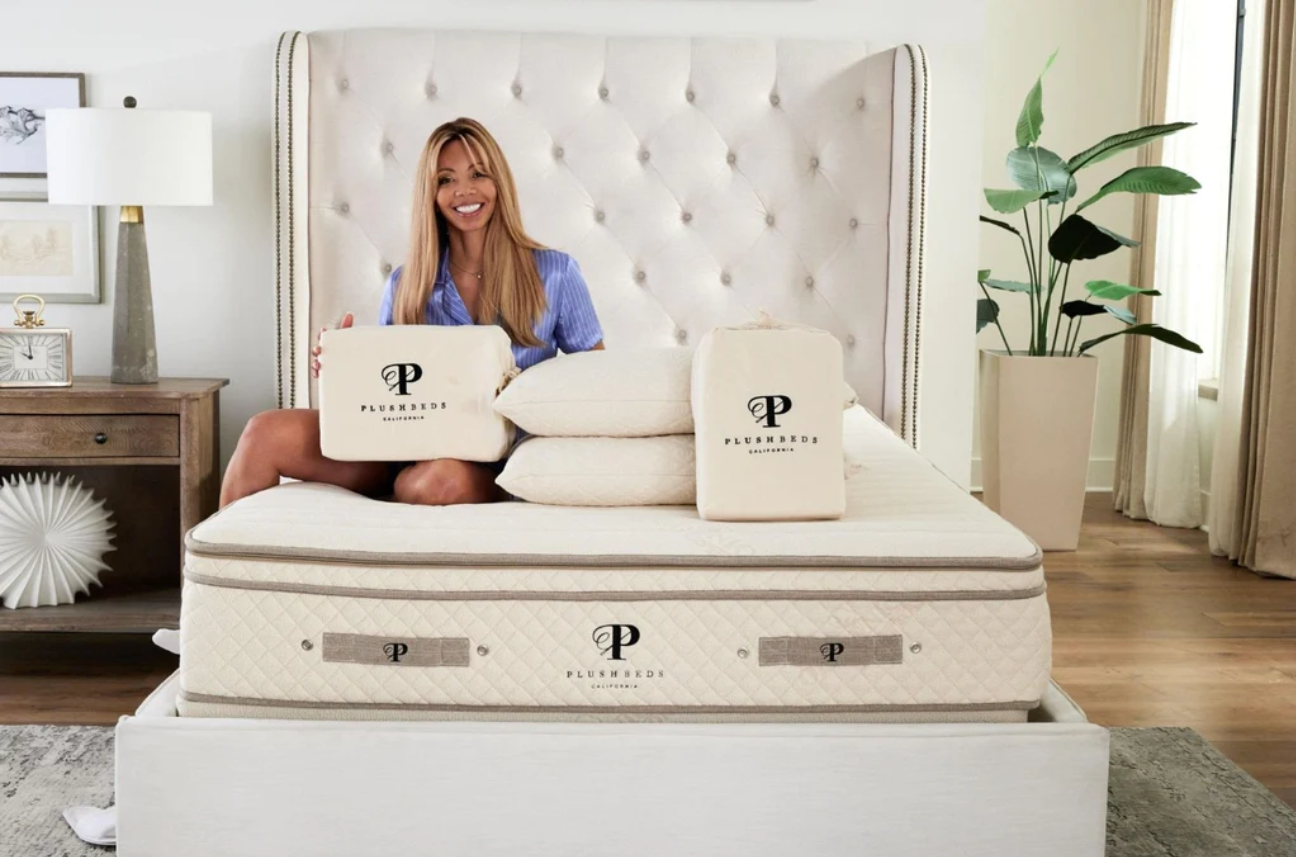Plush vs. Firm Mattress
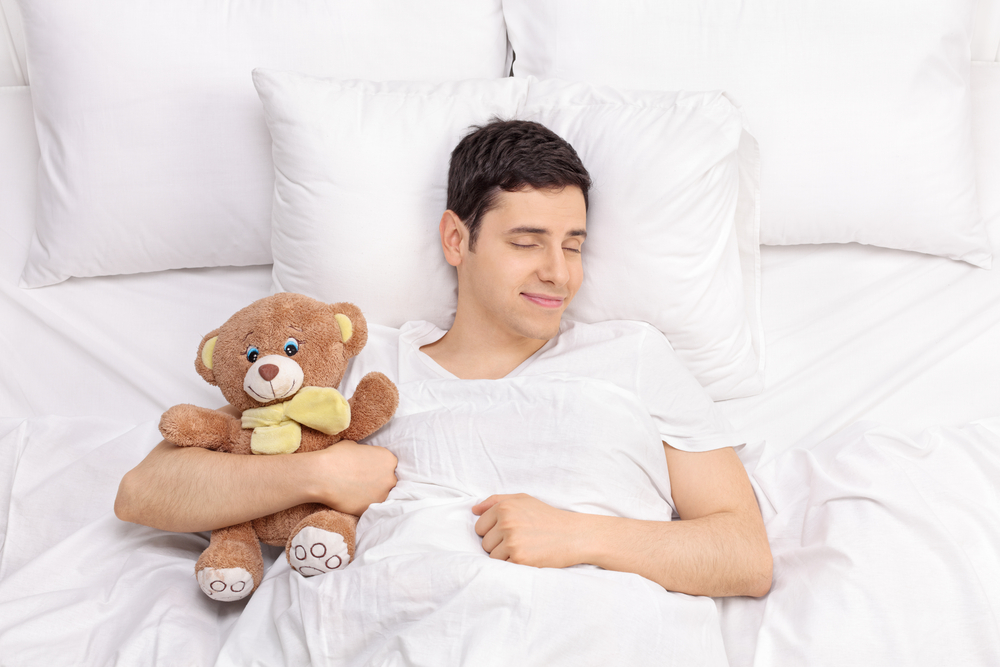
The firmness of your sleep surface has a direct impact on your sleep quality and physical health. Sleeping on an overly plush or overly firm bed can put pressure on the joints and even allow the spine to fall out of alignment. This mismatch can cause back and joint pain and put a serious damper on the quality and quantity of your sleep.
Fortunately, with a little research, you can rest assured you're picking the right firmness level for your comfort needs. Our comprehensive guide covers the main differences between a plush vs. firm mattress, the best bed for each firmness level, and how to know what level is right for you.
The Firmness Scale
This scale is used to measure the amount of balance that exists between body support and cushion. Generally, firmness runs from 1 - 10, with 1 being the softest. In most cases, you'll rarely find a bed firmer than an 8 or softer than a 3, as there's little to no demand for sleep surfaces with absolutely no give or body support.
While you can find an ultra-soft mattress, it doesn't deliver enough support for most individuals. Meanwhile, medium beds provide an equal balance between support and cushioning, and firm models have very little give and a whole lot of support.
Plush vs. Firm Mattress: Overview, Benefits, and Drawbacks
The obvious difference between plush and firm mattresses is the feel. A firm bed has less give and is more rigid to the touch, while a softer mattress will compress more easily when you exert pressure on it. However, it's important to note that there's more to these two mattress firmness levels than just how your mattress feels when you sleep on it.
Below, we'll talk about plush and firm mattresses and the differences between the two in great detail.
What's a Plush Mattress?
Plush mattresses feature thick and cushiony comfort layers that have a luxuriously soft feel and respond well under minimal body weight. Their extra padding is excellent for relieving painful pressure points.
Pressure relief is crucial for side sleepers, whose hips and shoulders experience pressure build-up as they sleep. So, if you're a side sleeper, you may want to go for a soft mattress that can help reduce discomfort around these pressure points while promoting proper spinal alignment.
Individuals who change sleeping positions at night may also prefer a soft mattress. However, pillow top and Euro top plush mattresses may hinder movement slightly as your body sinks into the pillowy surface.
Similarly, if you struggle with joint or muscle pain, a soft bed can work in your favor. The responsive design of plush mattresses allows them to contour to a sleeper's unique body shape while they sleep. This offers a high level of muscle and joint support. That said, if you're suffering from arthritis or targeted joint pain, a softer mattress will give you soothing nighttime relief.
Lightweight sleepers weighing less than 130 pounds often sleep well on plush beds. Petite individuals place less pressure on their sleep surface, meaning firmer mattresses with minimal cushioning might only cause chronic pain and difficulty sleeping. Since soft mattresses have lots of body cushioning and respond exceptionally well to minimal pressure, lighter individuals won't experience discomfort and pain.
Advantages of Sleeping on a Plush Mattress
Plush mattresses are usually recommended for lightweight sleepers and individuals who experience pain around their lower back. They're also ideal for side sleepers as they perfectly cushion the shoulders and hips, and promote proper spinal alignment.
Drawbacks of a Plush Bed
There are a few drawbacks you need to keep in mind before buying a plush mattress. For instance, some heavier sleepers may experience a sinking sensation, leading to chronic pain or stiffness.
Aside from this sinking sensation, plush beds may not be perfect for individuals with mobility issues. The give associated with them can make it quite hard for some sleepers to get in and out of bed.
Best Plush Mattress Overall: Amerisleep AS5 Mattress
As Amerisleep's softest mattress, the AS5 wraps sleepers in plush comfort that stays cool throughout the night. Aside from feeling cozy, the soft surface provides strong contouring for sleepers looking for extra pressure relief from their mattresses.
What We Like:
- Plush plant-based memory foam conforms perfectly to the body
- Targeted pressure relief for the hips and shoulders
- Durable foam base layer to support the spine
- Excellent airflow and breathability
What We Don't Like:
- Could be too soft for stomach and heavyweight sleepers (people over 250 pounds)
Amerisleep is running a sale on their mattresses, active today February 17, 2026!
Overall Thoughts
If you wake up with sore spots or stiffness around your spine, you should consider buying a bed that excels at pressure relief. The Amerisleep AS5 is a perfect example of a bed that contours closely to the body without sacrificing support. Side sleepers will enjoy the additional cushioning for their hips and shoulders, which are prone to pressure buildup.
The ultra-soft Amerisleep AS5 begins with the Bio-Pur memory foam that gives your mattress an invitingly plush surface. Available in every Amerisleep bed, this plant-based layer is engineered to provide cooling comfort, responsive body support, and healthier sleep. Its open-cell design promotes air circulation throughout the mattress, keeping you cool all night long.
Next is an Active Flex layer uniquely designed to minimize body sinkage without compromising your bed's plushness. Amerisleep's HIVE transition layer gives the sleeper's body targeted support to minimize tension and help them sleep in perfect alignment. It features hexagonal cutouts across its surface to give your hips and shoulders extra cushion and provide added support beneath your back, head, and legs. The HIVE technology is also ideal for reducing pain-causing pressure points.
The Bio-Core is a durable, supportive foam that supports the upper layers, preventing your mattress from sagging quickly. This stable structure increases your bed's expected lifespan, allowing it to offer nightly comfort for many years to come. The Refresh Cover encases the entire bed. Along with keeping sleepers cool, it promotes improved daily performance and energy by converting heat from the body into far infrared energy.
Amerisleep also manufactures the AS5 Hybrid, which features a core of pocketed coils. This version is designed for individuals seeking a soft bed with firm edge support and those who enjoy a springy softness.
The Amerisleep AS5 comes in seven mattress sizes, including a split king model for adjustable beds. Amerisleep offers free ground shipping anywhere within the contiguous U.S. The AS5 comes with a 100-night sleep trial. You'll also receive a 20-year warranty against structural defects.
What's a Firm Mattress?
Unlike soft mattresses, firm beds have thin comfort layers and stiff and durable support layers. They have very little give, so you won't sink much in the surface and won't feel overly cradled.
Firm mattresses also offer excellent body support to keep the spine perfectly aligned and prevent pain. While these mattresses feature thin comfort layers, they still provide users with a moderate amount of body support.
A mattress with minimal body cradling and maximum support works well for stomach and side sleepers. On a soft surface, these sleepers are at high risk of spinal misalignment, which can only lead to stiffness and lower back pain.
Individuals weighing over 230 pounds may also prefer firm mattresses over plush models. Since heavyweight sleepers usually place more pressure on their sleep surface, they need more pushback to prevent them from bottoming out.
Advantages of Sleeping on a Firm Mattress
For individuals not experiencing pain in their lower back, a firm bed will generally be more comfortable. When using a firmer mattress, your bones will absorb most of the pressure, so there will be less stress on your veins, arteries, and muscles.
A firm sleep surface also prevents your lower back from collapsing, which promotes more oxygen intake while you sleep. Less sagging means your body weight is evenly distributed. Therefore no one body section will bear the brunt of the pressure.
Another advantage of sleeping on a firm mattress is that it's ideal for motion isolation. If you're concerned about disrupting your spouse by tossing and turning in bed throughout the night, a firm bed can help minimize motion transfer from one side of the mattress to the other. However, it would help if you kept in mind that motion transfer prevention has a lot to do with the design of the internal layers.
Drawbacks of a Firm Mattress
Just like soft mattresses, purchasing a firm bed also comes with its own set of drawbacks. For starters, if you need a lot of comfort and body support as you sleep, you may find them too stiff. And as mentioned earlier, sleeping on a surface that's too firm can cause muscle stiffness or joint pain. Moreover, persons with severe joint issues may not get the right level of body cushion and support from a firm mattress.
Best Firm Mattress: PlushBeds Botanical Bliss Mattress
The PlushBeds Botanical Bliss Mattress offers an extra-firm feel perfect for sleepers over 230 pounds and anyone struggling to find a sleep surface with enough support.
What We Like:
- Excellent shoulder and neck support and pressure relief
- Soft mattress cover gives a relaxing feel
- Doesn't sink like memory foam
What We Don't Like:
- Too firm for side sleepers
Get a discount on this mattress and other models from Plush Beds with the button below
Overall Thoughts
PlushBeds' product line features an extensive selection of top-quality latex mattresses, each uniquely designed for specific individuals based on sleeping position, body type, and firmness preferences. The Botanical Bliss is among the firmest of the brand's all-latex mattresses. What really stands out about these mattresses is that you can unzip their covers and swap out the transition and comfort layers for a slightly firmer feel.
The PlushBeds Botanical Bliss Mattress begins with a pressure-relieving Talalay latex layer with a springy yet soft feel to give sleepers cushioned support and pressure relief on their hips, shoulders, muscles, and joints. It's also Oeko-tex certified, meaning you can rest assured it's made of high-quality organic materials.
Up next is a transition layer made of 100% all-natural Dunlop latex. This dense layer has a quick response to pressure that creates a very bouncy feel. Rounding out the PlushBeds Botanical Bliss is a thick base layer of firmer Dunlop latex. This later adds plenty of support to your mattress, increasing its durability.
An organic cover quilted with wool from New Zealand encases the Botanical Bliss Mattress. This plush cover is GOTS-certified and breathable to promote maximum airflow throughout the sleep surface. It's also mildew and dust mite resistant, making it ideal for those looking for an organic firm mattress.
The PlushBeds Botanical Bliss Mattress is available in 9 mattress sizes. Aside from the six standard sizes, you can opt for a split California king model if you and your spouse share an adjustable bed base. PlushBeds back their mattresses with a 100-night sleep trial. If you like how the Botanical Bliss performs and decide to keep it, you'll also receive a 25-year warranty that covers defects in materials and manufacturing.
Sleeper Profiles: Plush vs. Firm Mattress
Now let's look at the firmness level suitable for side, back, and stomach sleepers. While every sleeper has unique sleep preferences and needs, these general recommendations should point you in the right direction and help you determine the qualities to look for in your next mattress.
What's Better for Side Sleepers?
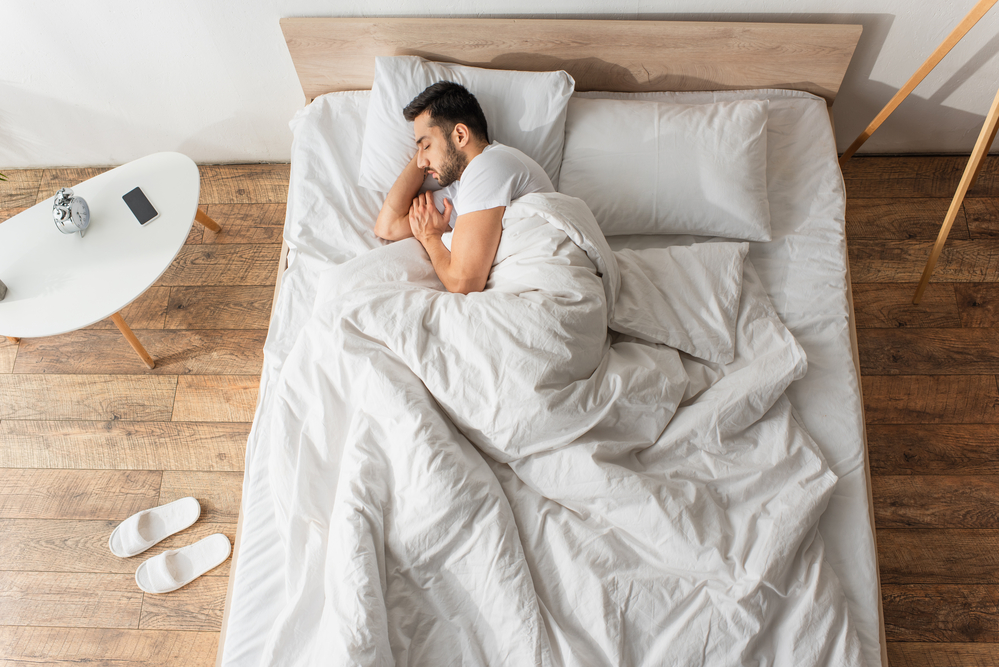
Generally, soft mattresses are best suited to side sleepers. If you're a side sleeper, a plush mattress will provide enough cushioning to protect your shoulders and hips from pain. Plus, it offers enough compression to contour to your unique shape, giving you the comfort and support you need.
What's Better for Back Sleepers?
Back sleepers should sleep on a medium-firm mattress as they need a lot of lift to keep their spine in perfect alignment while maintaining enough body contouring to protect their lumbar region from collapsing.
What's Better for Stomach Sleepers?
If you're a stomach sleeper, you need the firmest mattress to keep your pelvis lifted. When stomach sleeping, your hips sink deep into the surface. This can overarch your back, causing lower back pain. That's why you should go for a mattress with enough lift to keep your spine aligned when you sleep in this position.
What's Better for Combo Sleepers?
Combo sleepers generally need a medium bed as they change their sleeping position from night to night and, sometimes, several times throughout the night. A medium mattress offers the most versatile balance between body support and cradling, ideal for accommodating the largest combination of sleep styles. If you're looking for the best mattress for combination sleepers, you may also prefer a model with a coil support system to make movements across your sleep surface easier.
Is it Better to Sleep on a Plush or Firm Mattress?
Selecting a firmness level is a crucial step in your mattress search. Remember, firmness is somewhat subjective, so what feels comfortable to you may feel too firm or too soft for another. While finding the right level of firmness to suit your unique sleep needs will need a bit of trial and error, there are other vital things to consider when getting started.
Personal Preference
Personal preference is the most subjective factor. What firmness level feels comfortable to you and your spouse? Do you typically prefer soft mattresses, firm ones, or somewhere in between?
Body Weight
Your physical size and weight will affect how various levels of firmness feel. Generally, heavier sleepers prefer firmer mattresses. This is because soft models may sink in too deep for comfort and adequate body support.
Conversely, lightweight sleepers may sink in less in soft beds and find firmer versions uncomfortably hard. That's why they usually prefer soft to medium-firm alternatives.
Body Type
Every sleep surface is designed to accommodate a particular body type since every person exerts a different amount of force on their mattresses depending on their body weight.
For instance, if you weigh over 230 pounds, you can misalign your body posture when you sleep on a plush mattress. Similarly, individuals weighing at least 130 pounds may find a firm mattress uncomfortable. That said, choosing a bed relative to your body type is a must.
Partner Preference
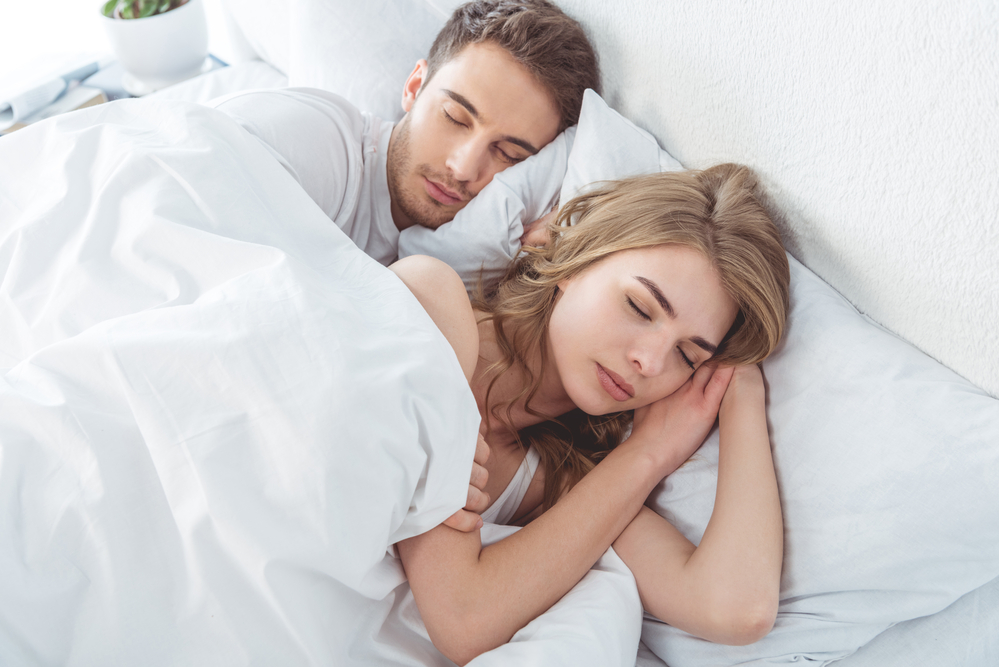
If you often share your mattress with your spouse, you'll also need to consider their unique preferences, body weight, and sleeping position.
When your preferences differ completely from your partner's, a specialized bed may be necessary. Some mattress manufacturers offer users the ability to customize their side of the mattress, while others manufacture mattresses with adjustable firmness settings that you can change as needed.
Firmness vs. Support
Firmness level refers to how your sleep surface feels, while body support refers to how well your bed can stabilize your body and promote spinal alignment.
Your sleep surface needs to be the right level of support to support your sleeping position and body type. If you sleep on a bed that's too soft to support your body weight, you'll sink deep into the surface, unnaturally curving your spine. And if your bed is too firm for your weight, the heavier sections of the body will just jut out, which might misalign your spine.
FAQs
Below are some of the frequently asked questions about plush and firm mattresses.
What's a Plush Comfort Level?
This is a level that tells you how soft your mattress is. When it comes to firmness level, plush beds usually fall around the 1 to 3 range. To find the right soft comfort level, consider trying out different types of mattresses before making a purchase decision. This will give you a perfect idea of your unique personal preference in terms of softness and body support.
Is a Plush or Firm Bed Better for Hip Pain?
In most instances, the best mattress for chronic hip pain is a plush model that can relieve pressure and tension. Soft mattresses are well-known for their contouring support properties. They can cradle and support hip joints, which is especially beneficial for minimizing pain for side and combination sleepers.
Heavyweight sleepers with hip pain may need slightly firmer beds to alleviate their pain. Back and stomach sleepers may also find more pain relief on firm mattresses. So, whether plush or firm mattresses are better for hip pain majorly depends on your body type and sleep style.
Can a Plush Mattress be too Soft for Your Needs?
A mattress can be too plush for certain individuals. If your bed is feeling too soft, you may want to check your warranty, as it may be time to replace it. If it's not due to be replaced, using a firm mattress topper can help add some firmness to it. To benefit the most from mattress toppers, opt for latex models that are at least 3 inches thick. Putting a piece of plywood beneath your mattress can also help make it firm.
Closing Thoughts
Now that you know the main differences between a plush and a firm mattress, and the merits of each, you're ready to pick the perfect fit for your needs. Aside from going for an option that suits your body type, sleeping position, and individual characteristics, look for a brand that offers a sleep trial period so that you can try out your new bed properly before you decide to commit to it long-term.
Gabe is the newest member of The Sleep Shop team. If you like the design of The Sleep Shop, give Gabe a thumbs up. He’s a digital marketing and design guru and the brains behind the design and SEO of The Sleep Shop. He also won’t say no to testing a ton of mattresses either, and helps on almost every mattress review.
Learn More About Gabe

